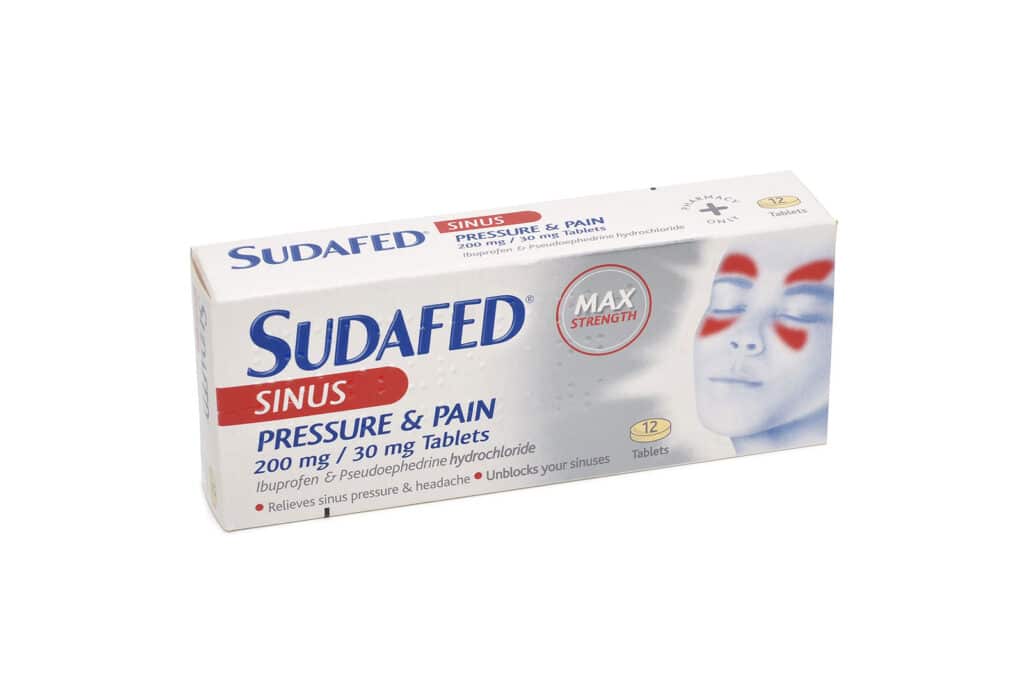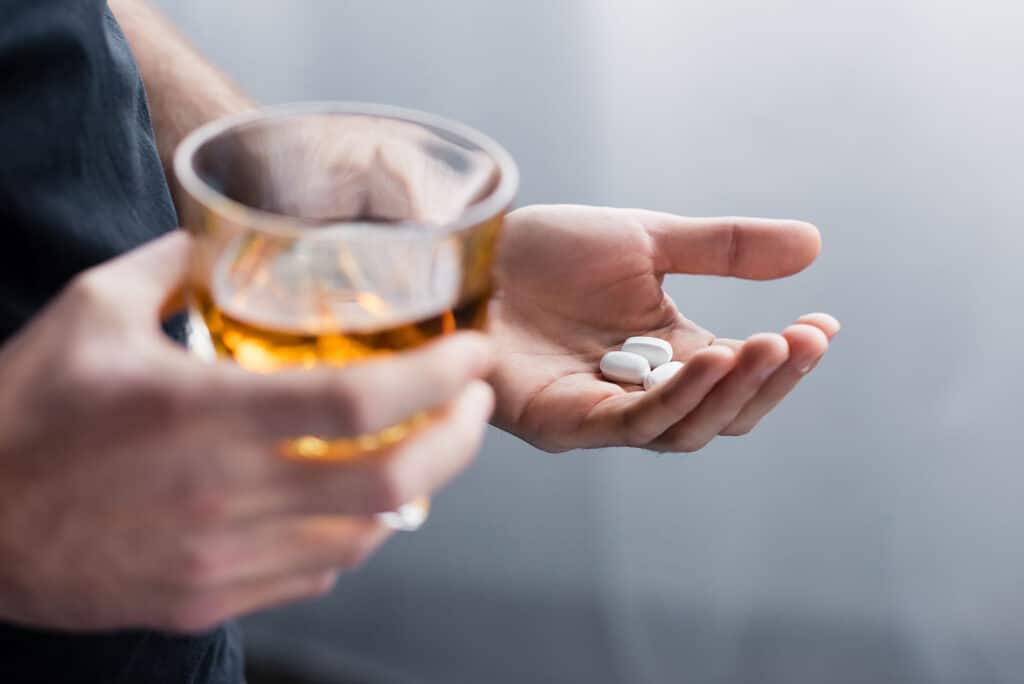If you’re feeling stuffy and uncomfortable, Sudafed can be a brilliant remedy to clear up your nasal congestion, and the best part is that it doesn’t require a prescription like many antihistamines.
That being said, a prescription-free medication can still have negative consequences if not used properly. For instance, you should be careful not to mix sudafed with some other drugs, including alcohol.
In today’s guide, we’ll take an in-depth look at Sudafed, covering all the potential effects of mixing it with alcohol. Let’s dive right in!
Table of Contents
- A Brief Overview of Sudafed and How it Works
- How Does Alcohol Affect Our Bodies?
- Is It Safe to Mix Sudafed and Alcohol?
- Other Common Drug Interactions with Sudafed
- When to Consume Alcohol Before and After Using Sudafed?
- What to Do If You Consumed Alcohol and Sudafed?
- Seeking Alcohol Addiction Treatment in Illinois
A Brief Overview of Sudafed and How it Works
Understanding what Sudafed is and how it works is essential for other information in this guide. So let’s start with a brief round-up of the drug.

Sudafed is one of the most popular brand names for pseudoephedrine, an over-the-counter (OTC) active ingredient used to treat a variety of symptoms, including:
- Sinus issues
- Nasal congestion
- Common colds
- Fever
- Asthma
As a natural stimulant, the drug exerts its nasal-relieving effects by constricting the blood vessels supplying the nasal passage. This results in reducing the congestion and swelling of the sinuses, which causes the “cleared nose” sensation after using the drug.
What makes pseudoephedrine unique is that, unlike many other stimulants, its side effects are quite milder.
In other words, it can still cause high blood pressure, rapid breathing, tachycardia (increased heart rate), and tremors. Yet, these effects are much less likely to manifest while using the safe dose of the drug and without mixing it with other drugs.
Still, since it can be used to manufacture stronger stimulants, such as amphetamines and methamphetamines, there are various restrictions regarding its purchase across the United States.
How Does Alcohol Affect Our Bodies?
Now that we’ve covered Sudafed, here’s a quick look at alcohol from a chemical point of view, and how it impacts the body.
Alcohol is a strong chemical that affects nearly every organ in your body, and contrary to popular belief, alcohol is actually a central nervous system depressant, not a stimulant.

Once you consume alcohol, it travels from your stomach and small intestine into your bloodstream. From there, it reaches your entire body, including your brain.
Alcohol disrupts the communication between brain cells, which can impair your judgment, coordination, and speech. It can also lead to memory problems, drowsiness, and blackouts due to severe intoxication.
It also has potent effects on various organs of the body, especially the liver, which is responsible for metabolizing alcohol. In fact, heavy drinking can lead to conditions like alcohol poisoning and cirrhosis.
Additionally, the side effects of alcohol are far-reaching and can impact a wide range of organs across the body, including:
- Heart: Can lead to high blood pressure and other heart problems
- Nervous system: Drinking alcohol excessively leads to permanent nerve cell damage, leading to impaired mental health
- Compromised immune system: Extreme alcohol use can weaken your immune system, making you more susceptible to infections.
- Organ damage: Besides the liver, alcohol can also affect other organs of the body, such as the pancreas (causing pancreatitis) and the stomach (causing severe irritation of the stomach lining)
Due to excessive alcohol interactions with other compounds, mixing alcohol with other drugs often leads to an increased risk of side effects in addition to worsening them.
Is It Safe to Mix Sudafed and Alcohol?
While Sudafed and alcohol won’t necessarily cause a severe adverse reaction, mixing them is still generally discouraged for several reasons. Here’s a quick look at some of the main reasons why you shouldn’t combine them:

Alcohol Reduces the Effectiveness of Sudafed
Since one drug is a stimulant and the other is a depressant, it’s no surprise that the two drugs go in the opposite direction when it comes to their effects on the body.
In fact, several studies have shown that alcohol consumption can directly contribute to nasal congestion, which defeats the decongestant properties of Sudafed and reduces its overall effectiveness.
Higher Risks of Manifested Side Effects
While the two drugs possess different effects on the body, they can still amplify certain side effects of each other.
For example, both substances can induce drowsiness and dizziness, and taking them together can significantly worsen these effects. This can be dangerous if it impairs your coordination or reaction time, increasing the risk of accidents or falls.
Similarly, Sudafed can cause a rise in heart rate and blood pressure. Alcohol can have a similar effect, and combining them can put additional strain on your cardiovascular system.
Sudafed Can Mask the Symptoms of Drug Intoxication
One of the dangers of mixing Sudafed and alcohol is that Sudafed can hide the effects of intoxication caused by alcohol.
As previously established, alcohol slows down the central nervous system, producing a sense of inebriation. Meanwhile, the stimulant properties of Sudafed have a counteracting effect, making you feel more alert.
This can be misleading because you might continue drinking even though you’re already significantly intoxicated, which can lead to serious complications including life-threatening alcohol poisoning
Other Common Drug Interactions with Sudafed
Sudafed can interact with several other medications, which can cause a wide range of adverse effects or reduce their effectiveness. Here’s a quick look at them:

Monoamine Oxidase Inhibitors
The most serious interaction of Sudafed is with MAO inhibitors, which function as sedatives, antidepressants, and treatments for Parkinson’s disease. This group includes various drugs, mainly phenelzine or tranylcypromine.
Combining the two medications can lead to a massive spike in blood pressure, and the problem here is that MAO inhibitors last for weeks in your system, so you have to wait longer before taking potentially interacting drugs.
Tricyclic Antidepressants
These are another group of antidepressants that work by affecting serotonin levels in the brain. Taking Sudafed with tricyclic antidepressants can increase the risk of insomnia and anxiety during the treatment course.
That’s why seeking medical advice to treat nasal congestion while using tricyclic antidepressants is essential
Alpha Blockers
Alpha-blockers are mainly used to treat enlarged prostate in men. Using Sudafed while on alpha blockers can increase urine retention, which reduces the effectiveness of the drug.
Sleep Medications
Since Sudafed is a stimulant, it can counteract the effect of many sedatives and sleep medications used to treat insomnia.
Some of these drugs also have an addictive potential upon misuse, which increases the risk of dependence when patients increase the dose on their own to counteract the effect of Sudafed.
Other Stimulants
Combining various stimulants can increase the effects of the drugs even more than the individual sum of the effectiveness of each drug. This is known as synergism and is widely common among drugs of the same functionality.
The problem here is that too much stimulant can result in exacerbated side effects, such as increased alertness, irritability, insomnia, and heart problems.

When to Consume Alcohol Before and After Using Sudafed?
As a general rule, it’s best to avoid alcohol altogether while taking Sudafed, as mixing them can cause a wide range of side effects and interactions that we’ve previously discussed.
For that reason, you need to wait anywhere between 24 to 36 hours until the effects of one drug are completely worn off before taking the other.
Keep in mind that this waiting period may extend if you use sustained-release versions of Sudafed. That’s why it’s always best to err on the side of caution and consult a doctor or a pharmacist for the ideal waiting time for your situation.
What to Do If You Consumed Alcohol and Sudafed?
If you accidentally consumed alcohol and Sudafed, here’s what to do. First and most importantly, you shouldn’t panic. This is because in most cases, consuming a moderate amount of alcohol with a single dose of Sudafed won’t cause a severe reaction.
Be aware of how you’re feeling, and look out for any signs of adverse reaction, such as increased dizziness, drowsiness, or a rise in heart rate.
If you experience any discomfort or these symptoms start worsening, seek medical attention immediately.
Of course, you should stop consuming any alcohol and try to purge it by drinking plenty of water. Staying hydrated is essential to help both substances leave your body quicker.
Once you’ve established you’re okay with no severe side effects, you may want to get some rest in a safe environment while keeping your loved ones informed to keep an eye on you.

Seeking Alcohol Addiction Treatment in Illinois
While responsible alcohol consumption can be fine as long as it stays in moderation, you should always be aware and cautious of its dangers, especially when you end up mixing it with medications like Sudafed.
You should also note that alcohol is a highly addictive substance that can significantly impact a person’s health, relationships, and overall well-being.
If you or someone you know is struggling with alcohol dependence in Illinois, Illinois Recovery Center is here to help.
Contact us to book a consultation session with an expert to help you start your journey towards abstinence.



